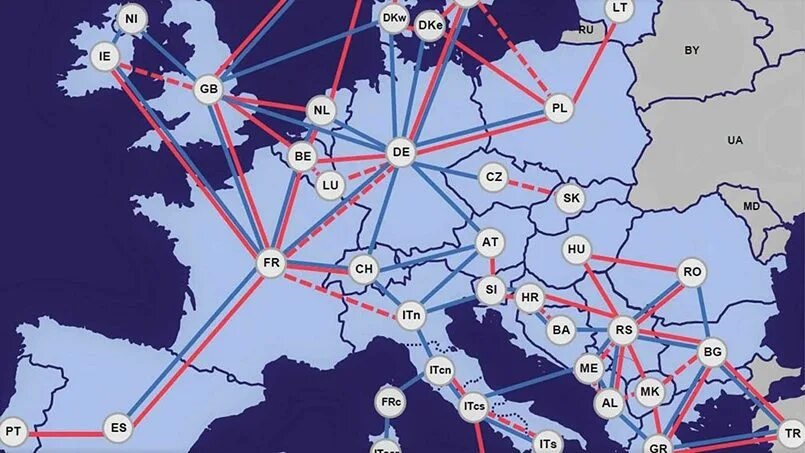 Energy system of Europe
Energy system of Europe
Pic.: openmodelica.org
Several countries in Europe have been scrambling to restore electricity after a huge power cut caused blackouts, writes ‘The Guardian’.
Spain, Portugal and some of south-west France suffered a massive power cut on Monday, with major cities including Madrid, Barcelona and Lisbon among those affected.
Houses, offices, trains, traffic lights and even the Madrid open tennis tournament were all hit, causing chaos for millions of people and prompting a scramble by the Spanish and Portuguese governments and network operators to understand the problem and race to fix it.
Red Eléctrica de España (REE), Spain’s electric network, said Spain and Portugal were hit by “el cero” – the zero. Its Portuguese counterpart, Redes Energéticas Nacionais (REN), said the outage started at 11:33am Western European summer time.
By mid-afternoon the Spanish operator, which is partly state-owned, said that it had started to recover voltage in the north, south and west of the Iberian peninsula. The recovery process could only be carried out gradually, to avoid overloading parts of the grid as each generator connects.
Endesa, Spain’s largest energy utility with 10 million customers, and Iberdrola, the second largest provider, said they were working with REE in accordance with established protocols.
The Portuguese prime minister, Luís Montenegro, said that the issue originated in Spain. Portugal’s REN said a “rare atmospheric phenomenon” had caused a severe imbalance in temperatures that led to the widespread shutdowns.
REN said: “Due to extreme temperature variations in the interior of Spain, there were anomalous oscillations in the very high voltage lines (400 kV), a phenomenon known as ‘induced atmospheric vibration’. These oscillations caused synchronisation failures between the electrical systems, leading to successive disturbances across the interconnected European network.”
The risks posed to electrical systems by big variations in atmospheric temperatures are well known in the industry, even if it is rare for problems to manifest on this scale.
“Due to the variation of the temperature, the parameters of the conductor change slightly,” said Taco Engelaar, managing director at Neara, a software provider to energy utilities. “It creates an imbalance in the frequency.”
Georg Zachmann, a senior fellow at Bruegel, a Brussels thinktank, said the system had suffered “cascading disconnections of power plants” – including one in France – when the frequency of the grid dropped below the European standard of 50Hz.
The European Council president, António Costa, who was Portugal’s prime minister from 2015 to 2024, said “there is no evidence that it was a cyber-attack”, but cautioned that the ultimate cause was still unclear. Senior European Commission vice-president Teresa Ribera also told Spain’s Radio 5 that there was no evidence of a deliberate act having caused the outage.
However, Spain’s national security council was convened on Monday to assess the outage. Portugal’s prime minister said it was too early to say for sure what caused the blackout.
Spain is on its way to being a green energy leader: it has abundant sun and wind. Last year was a record period for renewable power generation, which accounted for 56% of all electricity used. By 2030 that proportion will rise to 81%.
That shift will help Spain end its reliance on energy imports, but it also brings its own challenges. Every national grid in the world will need to spend heavily to upgrade distribution systems to connect scattered renewable generation and ensure it is balanced.
The grid needs constant management to ensure it is not overloaded by too much generation, or left short by too little. Power stations will shut down automatically if the frequency breaks out of normal range. To restart they must then be reconnected to users.
Balancing has been important as long as there has been a grid, but there is more focus on the issue because of the rapid switch to renewables like solar and wind, which are intermittent.
Spinning gas turbines have been the standard technology for managing the frequency for decades, but renewables will need investment in other options such as flywheels or advanced power electronics.
“You cannot ignore it,” Zachmann said. “You need the tools to keep the system running.”
Engelaar said such a widespread failure was “extremely unusual”. However, there have been previous examples. In 2003 a problem with a hydroelectric power line between Italy and Switzerland caused a huge outage across Italy for about 12 hours. A 2006 German power overload caused outages as far away as Portugal and Morocco.
“Interconnection between countries is vital for sharing clean energy, but it also creates new pathways for failure to spread quickly,” Engelaar said.
However, Bruegel’s Zachmann said that interconnections also help to prevent problems from getting worse. The interconnector with France will make it “much easier to bring the electricity system back”. “Yes, problems spill over but at the same time the larger system acts as a buffer and prevents the crisis escalating,” he said.
 Spaniards are spending the night in complete darkness.
Spaniards are spending the night in complete darkness.
Photo: Anadolu
A frantic search is on to figure out what, exactly, caused Spain and Portugal to lose power on Monday, leaving millions of people without access to basic modern necessities, writes POLITICO.
The answer will have serious ramifications for the two countries — and for Europe as a whole.
The EU has been pressing the Iberian Peninsula, which has long operated as an energy island within the bloc, to link up better to Europe’s grids. Already on Monday, specialists were debating whether such connections could have helped prevent the massive blackouts — or put more countries at risk of experiencing spillover effects.
There was also hand-wringing throughout the day about whether the outages were the work of cyber-saboteurs launching a strike on Europe — even as no evidence emerged suggesting that was the case.
On Monday afternoon, Eduardo Prieto, director of Spanish transmission system operator Red Eléctrica, said the blackout was caused by a “very strong oscillation in the electrical network” that led Spain’s power system to “disconnect from the European system, and the collapse of the Iberian electricity network at 12:38.”
A press conference by Spanish Prime Minister Pedro Sánchez late on Monday evening presented more questions than it answered.
Looking grave and warning that it may take longer to restore power than originally anticipated, the Socialist leader said: "This has never happened before."
Authorities in both countries declined to hypothesize as to what might have caused the imbalance in the power system.
"What caused it is something that the experts have not yet established — but they will," said Sánchez, adding that "no hypothesis has been rejected, and every possible cause is being investigated."
Spain and Portugal have tightly linked power systems with few cross-border links to France and the rest of the EU.
The European Commission, the EU’s executive, has long wanted to change that fact, strongly encouraging EU countries to build more interconnections. Officials argue the move would improve energy security and ease electricity flows across borders. Madrid, Lisbon and Paris have repeatedly signaled a willingness to move forward with that plan, but advances have been slow.
In Brussels, European Commission Executive Vice President Teresa Ribera appeared to dismiss that possibility, saying there was “nothing that allows us to say that there is any kind of sabotage or cyberattack.”
Spain and Portugal are champions of green energy in the EU, and were sourcing over 80 percent of their electricity from renewables just before the outage hit on Monday.
Experts have previously said that the rapid expansion of wind and solar power is putting increased pressure on the Spanish grid, which is in need of an upgrade to handle record volumes of intermittent renewables.
read more in our Telegram-channel https://t.me/The_International_Affairs

 10:11 30.04.2025 •
10:11 30.04.2025 •






















